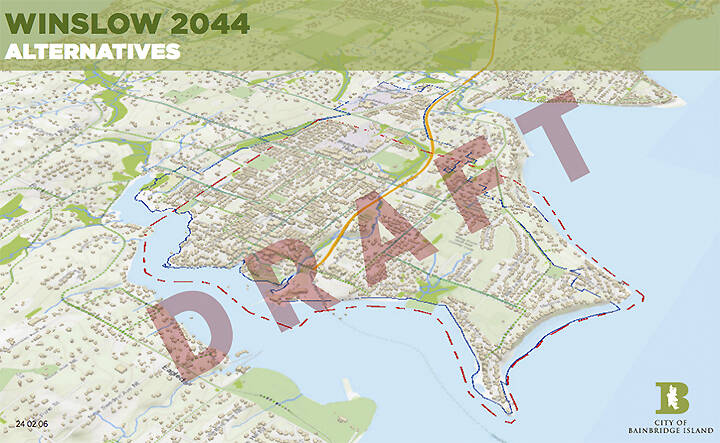Speed up, slow down, hold steady. Bainbridge Island City Councilmembers were all over the map when talking about the Comprehensive-Winslow Subarea plans March 19.
Deputy mayor Jon Quitslund wanted to discuss the topic to see where the rest of the council was on the topic.
But a couple of the councilmembers said not so fast.
Councilmember Clarence Moriwaki said he had agreed to discuss what they were going to discuss. He wanted to discuss scope, not a specific document like Quitslund wanted to. He said councilmembers were tired after a three-hour meeting so it wasn’t time to talk specifics. Besides, the public needs to get involved.
Councilmember Kirsten Hytopoulos agreed. She was ready to talk about a broader conversation and where they are in the process.
Quitslund said he just wanted to exchange ideas as the council still is “learning to work together.”
Mayor Joe Deets said he had no problem looking for common threads on the council. He said Alternative 1 does not work, he likes Alternative 2 and would consider Alternative 3.
Regarding the Winslow Plan, Alternative 1 is to do nothing, Alternative 2 would be building upward and having walkable corridors and Alternative 3 would be building out with middle housing expansion. Each alternative looks at mobility and open space.
Hytopoulos said they should not be talking about alternatives. There is still a lot of give and take and pro and con to be discussed on council, and with the public.
Moriwaki said he knows Quitslund is frustrated with the process taking so long. But he is well-versed on the topic after years on the Planning Commission, while others are just coming up to speed. “We’ll get there,” Moriwaki said.
Moriwaki also said he wants to listen to the public and do what it wants regarding plans for the future of BI. He said he doesn’t want the public to think the council thinks it’s smarter than them and know “what’s best for them.”
Quitslund said the public is “frustrated with what’s going on.” He’s concerned when the 200-page draft Environmental Impact Statement comes out people won’t have enough time to take it all in. He said he just wanted to get better acquainted with the council’s range of opinions and priorities. He said he just wants them all to understand one another. “I’m afraid I will never be understood,” he said. “I don’t want to engage in conflict.”
Hytopoulos said it might be hard to avoid that. “We can have robust discussion,” but she doesn’t want to undermine the process by getting too far ahead of itself. So far, the plans have been heavy with consultant and staff input, but their time is coming. “We’re the decision-makers ultimately.”
Quitslund said he just wants to stimulate discussion. “No two people on this council share the same set of assumptions, facts, opinions, aspirations or goals for long-range planning,” he said. “We are strong in our differences.”
In the end, he hopes the council plays a “key role and not a rubber stamping role” regarding the two plans.
Regarding the Comp Plan, city documents say the update consultant team conducted interviews with members of the BI community, intended to provide an introduction to the topics and issues on the community’s collective mind and to shape the project’s approach to optimize community engagement.
Key topics include: Active senior community; need for senior housing due to downsizing; political divide rather than seeing commonalities; local workforce housing needs; mobility diversity needs; more healthcare needed; more racial diversity needed; need for rural and nature; ferry traffic and roundabout concerns; tourism economic impacts; rising sea level; reduced housing footprint; declining school enrollment; anti-development attitudes; lack of BI nightlife; city staff culture of fear to disagree; lack of collaboration with other Kitsap County towns; wealth shaming; bias of housing types; climate change and community engagement.




